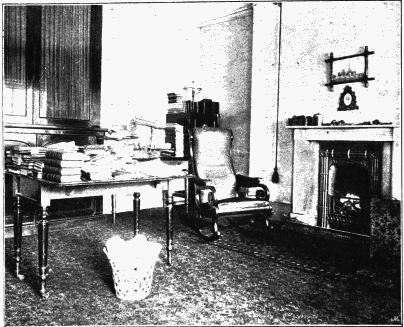
'Are you never afraid?' I once asked him tentatively.
'If I was,' he answered, quietly, but not contemptuously, 'I might count myself from that moment a dead man. Then, you see, I have my whip.' It was a carter's whip, good to keep off a dog, but scarcely a lion. 'The handle is loaded,' he explained, 'and I know exactly where to hit 'em with it, if the worst comes to the worst.' If I remember right, it was the tip of the nose.
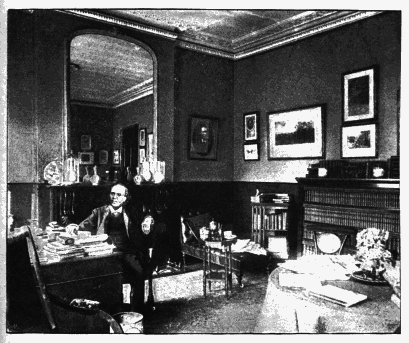
His conversation was delightful, and he often honoured me with his company at supper, when the toils and perils of the day were o'er. Upon the whole, though I have since known many other eminent persons, he has left a more marked impression on me than any of them, and it is no wonder that in those youthful days he influenced my imagination. His autobiography, without his having the least suspicion of the appropriation, became in fact my autobiography, as may be read (if there is anybody who has not enjoyed that treat) in 'The Family Scapegrace.' But, as my predecessors in the field of Fiction were wont to exclaim, 'I am anticipating.'
Another official connected with the menagerie gave daily lectures upon the animals, so curiously dry and grave that they filled me with admiration; he was like an embodiment of the answers to 'Mangnall's Questions.' Whatever suspicions Tickeracandua may have subsequently entertained of me, I am quite sure that 'Mr. Mopes' would no more have seen himself in the portrait I drew of him than would the animals under his charge, if their attention had been drawn to them, have recognised their counterfeit presentments outside the show. I also became acquainted with the Earthman and Earthwoman, the slaughterman of the establishment, Mr. and Mrs. Tredgold (its proprietors), and other individuals seldom met with in ordinary society.
The adventures of 'Richard Arbour' were, therefore, cut out for me in a most convenient and unexpected fashion, but I had the intelligence to perceive that though the interest they might excite would be dramatic enough, they would be in danger of dealing too much with the animal world to interest adult readers; nor would the narrative have made an attractive book for boys, since I felt it would be too full of fun (for my spirits were very high in those days) to suit juvenile tastes. I knew little of the world, but had seen much of boys (though I had never belonged to the species), and was well aware that, except as regards practical jokes, the boy is not gifted with humour. I accordingly looked about me for some dramatic material of a wholly different kind, and eventually found it in the person of Count Gotsuchakoff.
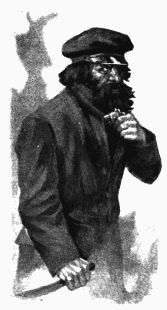
It was a mistake to call such a sombre and serious individual by so ludicrous a name, but it was a characteristic one. My disposition was at that time lively (not to say frivolous), and the atmosphere I usually lived in was one of mirth, but, as often happens, it had another side to it, which was melancholy almost to melodrama. In after years I found this to be the case in an infinitely greater story-teller, who, while he delighted all the world with humour and pathos, in reality nourished a taste for the weird and terrible, which, though its ghastly face but very rarely showed itself in his writings, was the favourite topic of his familiar and confidential talk. Tickeracandua himself was not dearer to me than the Count, who was almost entirely the offspring of my own invention; and though I have since seen in Nihilist novels a good many gentlemen of the same type, I venture to think that, slightly as he is sketched, he will bear comparison with the best of them. The conception of his long years of enforced silence, and even of the terrible moment in which he forgot that he was dumb, owed its origin, if I remember right, to a child's game that was popular in our nursery. It consisted in resisting the temptation to laugh, and the resolution to reply in tones of gravity when such questions as 'Have you heard the Emperor of Morocco is dead?' were put. The adaptation of it, in the substitution of speech for laughter, suddenly suggested itself, like any other happy thought.
Instead of writing straight ahead, as the fancy prompted, which, in my less ambitious attempts at Fiction (like all young writers) I had hitherto done, I had all these materials pretty well arranged in my mind before sitting down to write my first book. It was, after all, only a string of adventures, but it is still, and I think deservedly, a popular book. The question with its author, however, was how, when it was finished, he was to get it published. I took it to my friend, Robert Chambers, and asked for his opinion about it. He looked at the manuscript, which was certainly not in such good handwriting as his own, and observed slyly—
'Would you mind just reading a bit of it?'
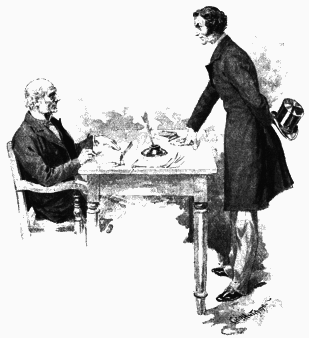
I had never done such a thing before, nor have I since, and the proposal was a little staggering, not to my amour propre, but to my natural modesty. Moreover, I mistrusted my ability to do justice to it, remembering what the poet has said about reading one's own productions:
The chariot wheels jar in the gates through which we drive them forth.
However, I started with it, and notwithstanding that we were subjected to 'jars' (one by the servant, who came to put coals on the fire, just at a crisis, and made me at heart a murderer), the specimen was pronounced satisfactory.
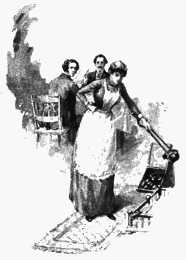
'I think it will suit nicely for the Journal,' said my friend, which I think were the pleasantest words I ever heard from the mouth of man. I might have taken them, indeed, as a good omen; for though I have since written more novels than I can count, I have never failed to secure serial publication for every one of them. 'This gentleman's novels are suitable enough for serial publication,' once wrote a critic of them, intending to be very particularly disagreeable, but it aroused no emotion in my breast warmer than gratitude.
So 'The Family Scapegrace' came out in Chambers's Journal. I do not remember whether it had any effect upon its circulation, but it was well spoken of, and there was at least one person in the world who thought it a masterpiece. The difficulty, which no one but a young and unknown writer can estimate, was to get a publisher to share in this belief. For many years afterwards I published my books anonymously (i.e., 'by the author' of so and so), and many a humorous interview I had with various denizens of Paternoster Row, to whom I (very strongly) recommended them, by proxy. 'If I were speaking to the author,' they said, 'it would be unpleasant to say this (that, and the other of a deprecatory character), but with you we can be quite frank.' And they were sometimes very frank; and, though I didn't much like it at the time, their candour (when I had sold the book tolerably well) tickled me afterwards immensely. For persons who have enjoyed this experience, mere literary criticism has henceforth no terrors.
